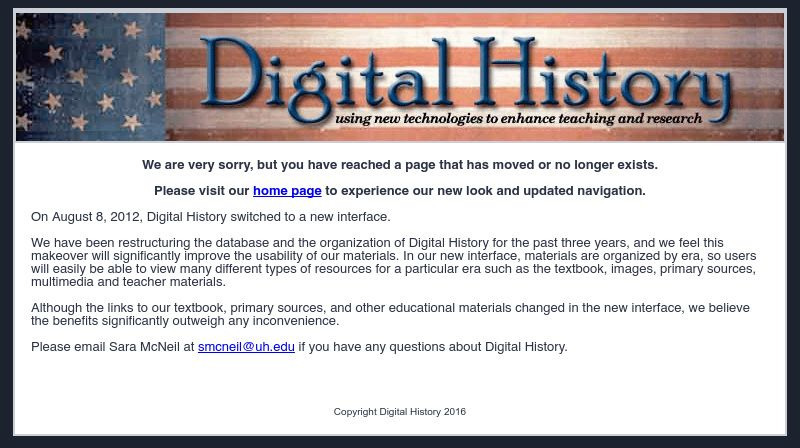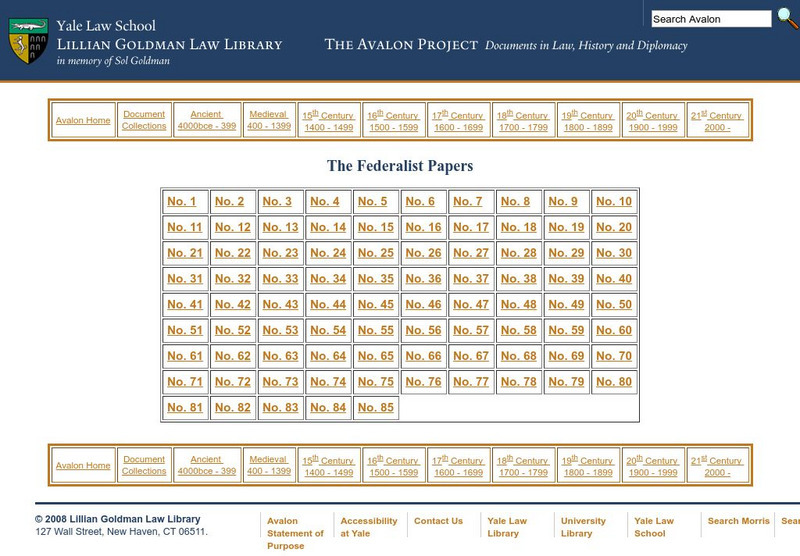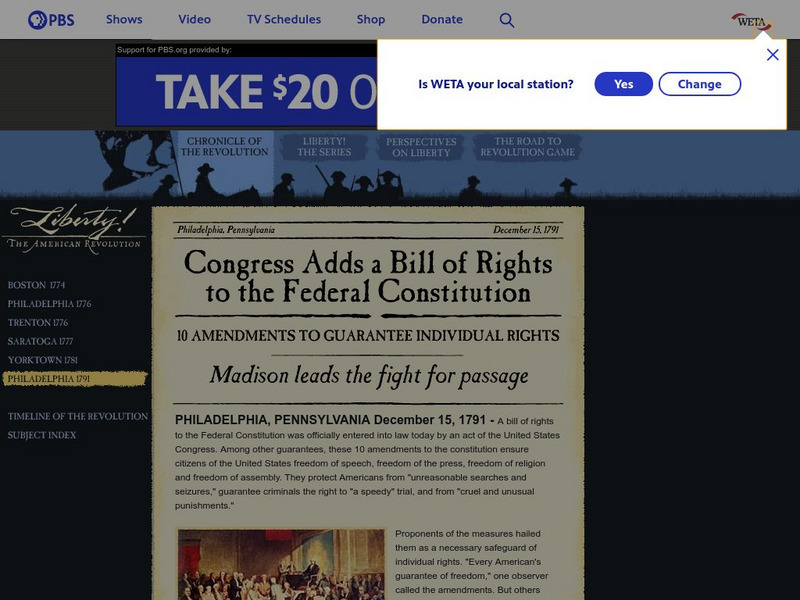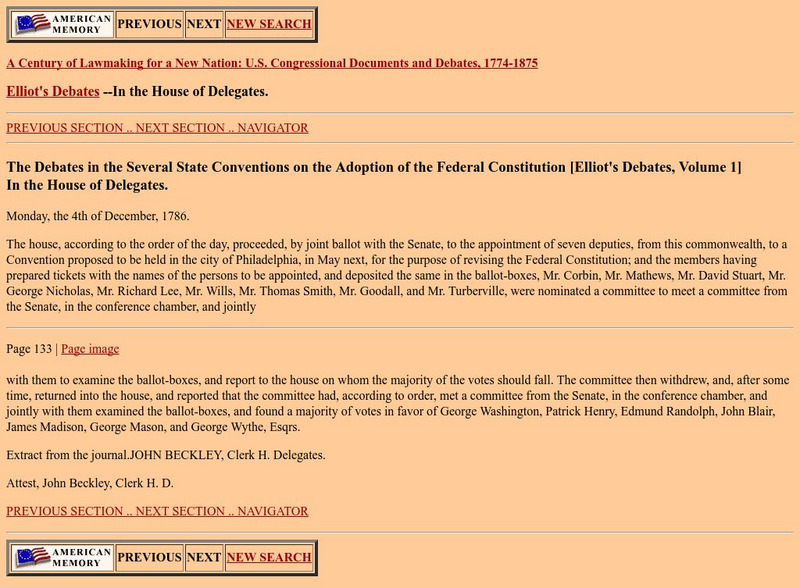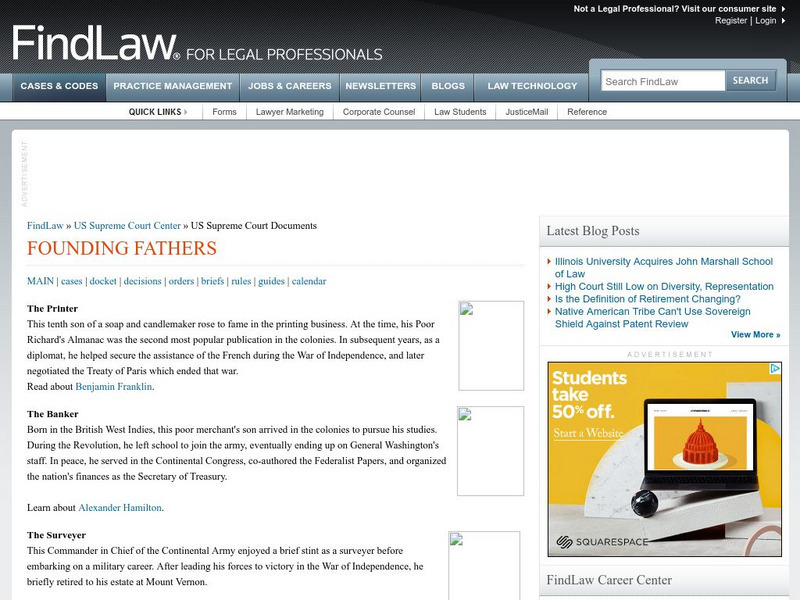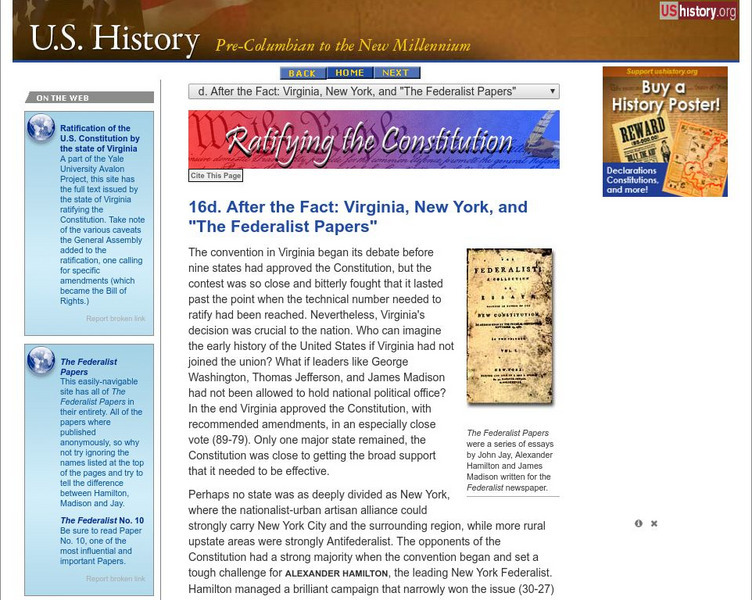University of Missouri
Exploring Constitutional Conflicts: The Constitutional Convention of 1787
One word can sum up the Constitutional Convention of 1787 - compromise. Find out which compromises were made and by which groups of people and/or states. This expansive site includes background on the convention, primary source...
Bill of Rights Institute
Bill of Rights Institute: Constitution of the United States of America (1787)
The Constitution was written in the summer of 1787 in Philadelphia, Pennsylvania, by delegates from 12 states, in order to replace the Articles of Confederation with a new form of government. It created a federal system with a national...
Digital History
Digital History: The Constitution and Slavery
The issue of slavery was a contentious one during debates in the Constitutional Convention. Read about the various issues, the quotes of several of the delegates, and see how the word "slave" is not even mentioned in the Constitution....
Ducksters
Ducksters: Us Government for Kids: Constitution
Read about the history of the United States Constitution, then try the multiple-choice quiz. Includes an audio narration of the text and a link to a biography of James Madison, as well as links to other resources.
US National Archives
Nara: Founding Fathers: Delegates to the Constitutional Convention
The National Archives and Records Administration (NARA) provides biographies of all 55 delegates to the Constitutional Convention.
Digital History
Digital History: Ratifying the Constitution
After the Constitution was written, debated, and finally adopted by the Constitutional Convention, it was sent to the states to ratify. Read about the fears of those who did not want to ratify it and see how their fears were addressed.
Michigan State University
Michigan State University: American Revolution: The Argument Over the Constitution
The National Humanities Center provides a full-length essay on the constitutional debate during the time of the Constitutional Convention.
Digital History
Digital History: Drafting the Constitution
Those writing the Constitution had many issues to deal with in forming a document to govern the country. One thorny issue was the status of the states in regard to representation in the federal legislature. Read about the Virginia Plan...
Digital History
Digital History: The Debate Over Ratifying the Constitution [Pdf]
Read about why ratification of the United States' new constitution was such a struggle. Find arguments for and against ratification, and discover who supported the Federalist position and who the Anti-Federalist position. [PDF]
Khan Academy
Khan Academy: Us History: 1754 1800: The Federalist Papers
In the Federalist Papers, Alexander Hamilton, James Madison and John Jay made the case for ratifying the new US Constitution.
Bill of Rights Institute
Bill of Rights Institute: Constitutional Principles
James Madison knew that a key challenge of maintaining just government was framing it in such a way that the government would be forced to control itself. How does a system of separated powers-and the checks and balances built into those...
The History Place
The History Place: A New Nation (1784 to 1790)
This site from The History Place provides a timeline of American history between 1784 and 1790. Mentions many famous people and events of the era. Links to John Adams, Thomas Jefferson, Samuel Adams, James Madison, the Constitution, Bill...
Center For Civic Education
Center for Civic Education: Presidents' Day Lessons
Presidents' Day lessons for Grades 10-12 on the constitutional legacies of George Washington, James Madison, Abraham Lincoln, and Ronald Reagan, and how they shaped the history and Constitution of our nation. Each lesson was written and...
Siteseen
Siteseen: Government and Constitution: Federalist Papers
The Federalist Papers were a series of 85 essays that promoted the ratification of the United States Constitution and the nature of a Republican government.
Yale University
Avalon Project: The Federalist Papers
With this resource, you can search by keyword for particular subjects within the Federalist Papers, or you can access by number each of the Papers. Also available are links to four related documents: The Annapolis Convention, Articles of...
University of Oklahoma
University of Oklahoma Law Library: Federalist Papers
The complete text of the 85 Federalist Papers which explained why the authors believed the new Constitution should be ratified.
PBS
Pbs Liberty!: Congress Adds a Bill of Rights
Informative site recounting the events of December 15, 1791, when the Bill of Rights was added to the Constitution. Learn about the Bill of Rights and the freedoms it was designed to protect!
Henry J. Sage
Sage American History: Benjamin Franklin's Speech
From James Madison's notes, this speech is Benjamin Franklin's final speech of the Constitutional Convention.
Digital History
Digital History: Was the Constitutional Convention Legal?
A look at the convening of a Constitutional Convention to address the problems inherent in the Articles of Confederation. Read a quote from George Washington, who addressed the legality of such a convention.
Library of Congress
Loc: American Memory: Debates in Several State Conventions
Read the authentic notes on Virginia's selection of their delegates to the Federal Constitutional Convention. The transcript describes the nominations and the final tally - George Washington, Patrick Henry, Edmund Randolph, John Blair,...
Constitutional Rights Foundation
Constitutional Rights Foundation: The War of 1812: America's First Declared War [Pdf]
Article discusses the War of 1812 as America's first declared war and what that meant for the future of the U.S. Includes questions for discussion and small group activity.
Thomson Reuters
Find Law: Founding Fathers
This site provides a very brief description of three of the founding fathers of the Constitution: Benjamin Franklin, Alexander Hamilton, and George Washington. The site provides links to further biographies of all three men as well as...
Digital History
Digital History: The Men of Philadelphia [Pdf]
Find short biographies of twenty-three of the fifty-five delegates to the Constitutional Convention and their ideas about government. These men were certainly not representative of the common man in the new United States, but they were...
Independence Hall Association
U.s. History: After the Fact: Virginia, New Yok, and "The Federalist Papers"
Read about the necessity for Virginia and New York to support the ratification of the Constitution. See what influenced the vote in Virginia and how the legislature of New York was finally convinced.




